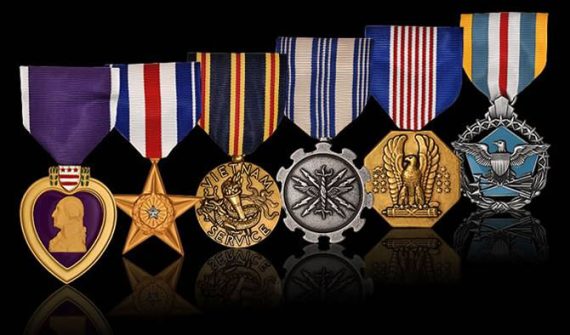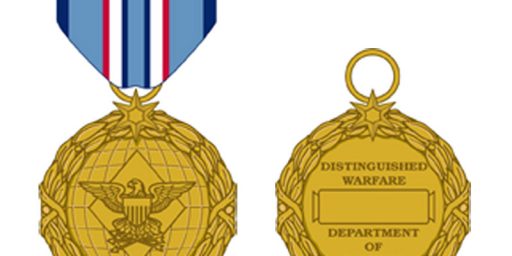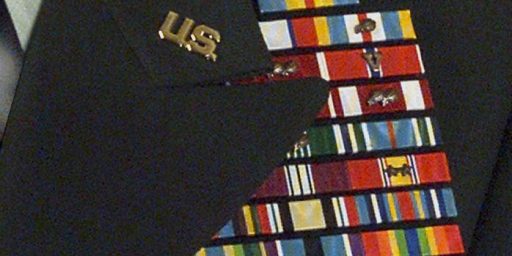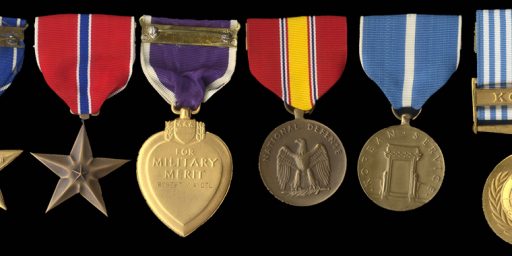Medal Fatigue
The US military needs to cull and standardize its bloated award system.
My latest for War on the Rocks, “Medal Fatigue,” has posted. The topic will likely be of little interest to those without military experience. The crux of my argument:
After a bitter controversy over how to recognize the contributions those who fly drones stateside make to the fight against global terrorism, the Pentagon is undertaking a “comprehensive review” of the entire awards system. It’s long overdue.
[…]
While details are scant on what the review board’s mission will be, it’s time for a substantial culling of the current inventory of medals and ribbons, which is bloated because of parochial service interests and the creation of a plethora of peacetime medals 30-plus years ago. Further, we need a standardization of awards, instead of the present system where the same medals and devices mean different things depending on what uniform one wears.
[…]
Given the post-Goldwater Nichols emphasis on jointness, it probably makes sense to keep the “Defense” variants of the Distinguished Service, Meritorious Service, Commendation, and Achievement medals to recognize those who have served in joint billets. But we should merge all the others into single, service-neutral awards. Similarly, there’s no reason to have service-specific Good Conduct, Overseas Service, Sea Service, and Professional Development medals and ribbons. In addition to radically streamlining the awards list, it would have the additional benefit of making everyone’s ribbon rack recognizable to members of other services. Not only do the six Distinguished Service Medal variants, to take one example, look completely different from one another but another service’s variant is easily confused with similar-looking but completely different medals from one’s own service.
Beyond that, the Pentagon should standardize the way we recognize school completion, skill attainment, longevity, and the like. Currently, some services award medals or ribbons for completing required schools, qualifying with a weapon, hitting time-in-service milestones, serving as a drill instructor, and so forth while others instead award badges or service stripes or offer no recognition at all. My instinct is that medals and ribbons should be reserved for special achievement, rather than meeting required standards. Regardless, however, all services should recognize the same accomplishments in the same manner, preferably with identical ribbons and badges. In addition to preventing, say, an airmen from having twice the ribbons as a Marine with comparable achievements, it simply makes sense to have both be able to instantly recognize the other’s achievements.
Aside from needing streamlining and standardization across services, the American military has a serious case of medal proliferation.
[…]
My contemporaries who remained in, colonels now, look like South American field marshals. The Army has been in so many engagements in the last twenty years, each with their own campaign medals and associated foreign awards, that I no longer recognize many of the awards being worn by today’s soldiers. And, of course, they never got rid of all those medals they created for the peacetime military of 1981.
Hagel’s commission is unlikely to radically reverse this. We’re not going to take medals and ribbons away from those who have them now and admitting that most of the ones we do have are of low value risks hurting the feelings of those who wear them. But consolidating, streamlining, and standardizing our awards system would at least make it more fair and transparent.
In between those passages is a lot of detail that will either interest or bore you depending on whether you care about the subject.







As the son of a WWII veteran who was awarded a bronze star and a Vietnam era veteran myself I find the idea of giving drone pilots doing their job in safety in the United States medals to be offensive. They are not risking life and limb but simply doing the job they were assigned to do.
@Ron Beasley: Well, we give out medals all the time to people just doing their jobs. So long as they’re not heroism awards and they’re awarded with relative uniformity across units and services, I don’t have a problem with that. Look at the history of the Bronze Star: It was created by George Marshall as a morale booster for grunts.
@James Joyner:
Certificates of a job well done I don’t have a problem with. Even medals for serving in a combat arena are OK. But for the most part medals should be awarded for risking life and limb. I don’t know about the history of the bronze star but my father got his for taking his group behind enemy lines to repair a downed aircraft. A little different than piloting drones 1000s of miles from the combat zone. I received a couple of attaboys for a job well done in my office in Munich but no medals – as it should be. The fact that we give out medals to people just doing their jobs does not make it right. Medals should be for heroism not competence.
@Ron Beasley: So troops who make vital contributions to the success of the mission in support roles don’t get medals?
I once served as a communications specialist during a mission, but not with the forward combat unit, instead at the command post. I was pretty far from the action, certainly. But there was an equipment failure that threatened to cut communications with the forward unit, which would have resulted in the aborting of the mission. I was the one who brought communications back on line when others could not. I got a medal for that. Should I not have? I don’t understand how literally saving the mission from failure doesn’t warrant an award just because bullets weren’t flying at me.
You’re post made me think of the scene from “I’m Gonna Git You Sucka” where they are comparing medals they got from being Inter-Military Administrators.
http://youtu.be/9CBTYmZfDTI
It’s always amusing to see a first term enlistee with 3 rows of ribbons.
@DC Loser: Yup. Then again, I went from having one ribbon after three years of service to having eight ribbons three years after leaving the Army.
1988 to 1990: Army Service Ribbon
1991: National Defense Service Medal, Southwest Asia Service Medal with 2 campaign stars, Bronze Star
1992: Army Commendation Medal, Overseas Service Ribbon (both worn only on the plane ride from Germany to Fort Dix to outprocess)
post-1992: third campaign star, Saudi version of Liberation of Kuwait Medal, Kuwaiti version
So, 8 ribbons after ~4 years of service but most of them never worn or worn only once while in uniform
6 years in, Army Service Ribbon, National Defense Service Medal (or, I’m in the Army and I’m in the Army at the right time). Got an Arcom, a AAM, and two MSMs, were any of them because I was in danger of losing life or limb, nope (well, when the person running the tax program up and quit, and it was discovered that she hadn’t filed any of the taxes, things got a little dicey when my boss handed me that pile of crap). But, except for the first two, were given for taking on and handling some high profile and difficult things. Were they deserving of recognition, probably, medals? Who knows.
I would hope that they could standardize color/shape or something so that medals for valor could be instantly recognized. Otherwise, I think medals for outstanding service are fine, but I would do away ones that are doing required schools and time in service kind of stuff. (Arent service stripes good enough?)
Steve
I was seven years in as an officer before I got a personal medal (Navy Comm). But I don’t care about how many ribbons folks get, so long as they are acknowledged as just being ribbons. Sea Service, marksmanship, overseas deployment ( AKA Coca Cola Award). But I was assigned at the Pentagon when it was actually attacked, and I proudly wear the Global War on Terrorism medal. I went into the mold infested areas to recover files (volunteer), it was nasty But most of my experience was Cold War in places I can’t talk about even today, and a senior O-3 or O-4 would get a Service Commendation Medal if they were lucky, more likely an Achievement Medal (Ach is below Comm).
Going to a school at the 7-9 year point, I arrived with a marksman award (everyone has it), sea service, and Navy Expeditionary (Means I can join the VFW). So 3 ribbons. A few weeks later I was awarded a Navy Commendation (Awards take some time) and was one of 3 in a class of 30 that had such a high award. And zero Navy Achievements. Wow, 4 ribbons on my chest. And we joked about USAF ribbons even then.
Today I’m frequently on Army and USAF bases, and do a double take at an E-4 with service Commendation (with no V), or the Army E-5 with a MSM I saw a month ago at the Commissary and I was wondering what he/she did to get that award. Wasn’t in the base paper.
@steve: I’m pretty sure it’s that way now, with round medals being “not for combat service”, more-or-less. I know that when I wear my Mess Dress, almost all of my “miniature medals” are round – in fact, they’re almost all for awards called “awards” or even “ribbons”; only a very few have the word “medal” in their name.
@Electroman: There are no miniature medals for the awards that are just “Ribbon.” So, I have eight ribbons but only six medals on my mini rack because neither the Army Service Ribbon nor the Overseas Service Ribbon have a medal.
@James Joyner: I’m shocked, but have no counterexample, so I’m sure you’re right. After all, I haven’t worn my Mess Dress in a few years. Plus, the second thing that goes with age is my memory….and I forget the first thing!
I take pride in the fact that after four years in the Corps (so long ago, y’all don’t want to know), I came out with exactly one medal: A good conduct medal, which, as we all know — or should know — merely represented four years of undetected crime. (I’m not counting my shooting medal — that went with the territory.) Of course, the only time I got shot at was in Tijuana one Saturday night, but this is a family blog…
@Mikey:
Yes, that’s right, they don’t get medals. Because making vital contributions in support of the mission IS THEIR JOB. You don’t get a medal for doing your job, you get it for risking life and limb by going above and beyond the call of duty.
Yes, you should not have gotten a medal for that.
Because bullets weren’t flying at you. You only did what you were supposed to do, nothing more. You weren’t at risk, you didn’t demonstrate valor, you weren’t brave or courageous, you had no chance of having your limbs torn from your body or your intestines spilled out onto the sand.
@Rafer Janders: The entire purpose of military medals is to improve troop morale. A little piece of cloth means recognition for doing a lousy job for little pay.
Obviously, it makes sense to exalt heroism in combat. We do that. But it also makes sense to reward people who provide support to those going downrange.
My only qualms about the present system are:
1) Too many awards for just showing up rather than doing ones job well.
2) Too many awards, period, making it difficult to tell who has what and creating disparities between units and services with who gets what.
“Give me enough shiny pieces of metal and brightly colored bits of cloth and I will conquer the world” – Napoleon (probably apocryphal).
@Rafer Janders:
BULLSHIT. What I did wasn’t just “my job.” What I did was what was expected of people considerably senior to me in training, experience, and rank. But they couldn’t do it and I did. I did far more than merely what I was “supposed to do.”
Also, as James points out, medals are a way to recognize exemplary performance in all aspects of military jobs. A servicemember whose quick thinking, technical know-how, and calmness under extreme pressure literally save a mission from failure can’t get a bonus, because the military doesn’t award those, but he can get a medal.
To assert that the actions of those who support troops in combat, and without whom every engagement would end in abysmal defeat, are not worth recognition, is ridiculous.
When I was a child I was fascinated with the military brass and all of their beautiful medals. I always wanted to meet a general in person. My favorite generals are George Marshall, George Patton, Maxwell Taylor, Omar Bradley. Further past: Stonewall Jackson, Ambrose Burnside, and George Armstrong Custer.
In general I agree. I would add that medal bloat gets really big for someone like me who served in more than one service, then when you add joint awards, it’s not hard to have three achievement medals that are all essentially identical in terms of substance. Recent changes confuse things further. For example, until 2001 the Bronze Star was reserved for Meritorious service in a combat zone (if the award is for heroism and note merely merit, then the “V” device is awarded) and the MSM was for meritorious service not in a combat zone. Since that time the distinction has blurred somewhat but that’s still the rule of thumb (for example, we’ve had MSM’s rejected because reviewers said they should be submitted as Bronze Stars
@Ron Beasley:
People serving in combat zones are also “just doing their job.” Not everyone in a combat zone gets a medal. One can perform “meritorious” service anywhere, not just in a defined “combat zone.” I do think there should be a clearer distinction for awards earned in actual combat, where there is a clear and imminent threat of loss of life.
As for drone pilots (and crews, pilots don’t work alone), they are valuable contributors and those contributions should be recognized when they are sufficiently meritorious. Drone crews saved a lot of lives and they shouldn’t be denied recognition.
I strongly disagree that award criteria should be standardized across services. First, it won’t work. The Air Force will still give out awards like candy (especially if you’re a cute female, it’s been that way for at least 40 years), and the Marines will still begrudge any medal awarded to anyone still breathing. The standardization approach captures the worst of all worlds.
I don’t mind that my Good Conduct Medal required 4 years (as in the Marine Corps), while my Army and Air Force comrades get them in 3 years. We all know the difference, and we don’t look down on a Marine with a mere 3 ribbons, nor do we respect someone in the Air Force for their 700 ribbons (but they’re still my brothers; if you’re not in the military, you don’t get to insult them the way I get to insult them).
It doesn’t matter how you manipulate the system. It doesn’t take long for folks to figure out where everybody stands. Trying to standardize across services would yield a loss in service-specific esprit de corps with precisely zero benefit.
@Boyd: Hey, some of those 700 ribbons actually mean something. But even we Air Force people know which ones don’t. Like, why on Earth did I get a ribbon for completing NCO PME? Almost every NCO does, because if you don’t, you don’t get promoted. Likewise with the “Longevity Service Award.” We called that one the “I made it another four years without getting thrown out ribbon.” Silly.
I never understood the US enamoration with personal valor over achievement. The private who jumps on a grenade saving 5 gets the Medal, the general who cleverly bypasses a heavily fortified position to capture an opposing army, saving thousands of casualties from a direct assault, does not. In regards to inflation, since 9/11, the army has handed out 60,000 bronze stars, but only 40,000 CIB. Getting a bronze star no longer requires getting shot at.
Agree that attempting to standardize across the services wouldn’t work– they just mean different things to different services, and would continue to. Things like the sea service ribbon mean something entirely different in the Navy than they would to an airman.
Doing something to scale back the proliferation, though, would certainly be a great idea. The whole concept of an “end of tour” award is just stupid to me.
Apples and oranges. The CIB/CAB/CMB are only awarded once per individual per conflict period, while the Bronze Star can be awarded multiple times to an individual. Its not uncommon to have someone awarded both a Bronze star for service and valor during the same tour.
About 3 % of the 160,000 Bronze Stars awarded since 9/11 have been for valor, a significantly lower percentage than WWII to Desert Storm (average was 10%), so in some respects is actually been much harder get awarded.
So the Bronze Star was made for GRUNTS by 5 Star General Marshall to help moral???
Give me the number of grunts that have receive this Bronze Star for Meritorious Service and maybe we can see where the problem is ???
None would be a good guess on my part !!!!!!
High ranking desk jockey’s will give you a closer estimate in numbers
How am I doing so far???.
@MICHAEL COX: You’re batting .000, I’m afraid. Literally every soldier who served as an infantryman in WWII who earned a CIB was authorized the Bronze Star.